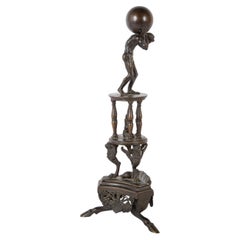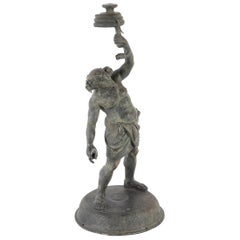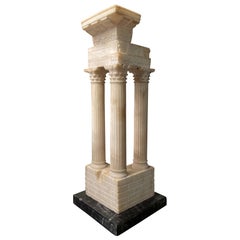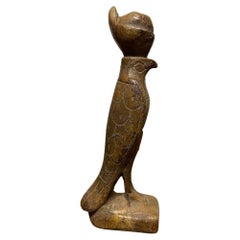Want more images or videos?
Request additional images or videos from the seller
1 of 11
Grand Tour Bronze of 'La Fontana Delle Tartarughe' (the Turtle Fountain)
$5,500List Price
About the Item
- Dimensions:Height: 8 in (20.32 cm)Width: 6 in (15.24 cm)Depth: 6 in (15.24 cm)
- Style:Renaissance (In the Style Of)
- Place of Origin:
- Period:
- Date of Manufacture:circa 1890
- Condition:Wear consistent with age and use.
- Seller Location:Stamford, CT
- Reference Number:1stDibs: LU80301664272
About the Seller
5.0
Platinum Seller
Premium sellers with a 4.7+ rating and 24-hour response times
Established in 1990
1stDibs seller since 2004
480 sales on 1stDibs
Authenticity Guarantee
In the unlikely event there’s an issue with an item’s authenticity, contact us within 1 year for a full refund. DetailsMoney-Back Guarantee
If your item is not as described, is damaged in transit, or does not arrive, contact us within 7 days for a full refund. Details24-Hour Cancellation
You have a 24-hour grace period in which to reconsider your purchase, with no questions asked.Vetted Professional Sellers
Our world-class sellers must adhere to strict standards for service and quality, maintaining the integrity of our listings.Price-Match Guarantee
If you find that a seller listed the same item for a lower price elsewhere, we’ll match it.Trusted Global Delivery
Our best-in-class carrier network provides specialized shipping options worldwide, including custom delivery.You May Also Like
Nude Male Bronze Sculpture Fountain
Located in Malibu, CA
Bronze male sculpture signed. Fonderia Giorgio Sommer Calabritto Napoli
Thomas, sculptor, lived and worked in the Naples area, and especially on Capri, from 1889 to 1906. Given this ...
Category
20th Century Italian Renaissance Figurative Sculptures
Materials
Carrara Marble, Bronze
Large Bronze Figurative Sculptural Fountain by Canpiola
Located in London, GB
Large bronze figurative sculptural fountain by Canpiola
Italian, c. 1910
Measures: Height 130cm, width 67cm, depth 54cm
This impressive bronze fountain is finished with a beauti...
Category
Early 20th Century Italian Animal Sculptures
Materials
Bronze
Large Patinated Bronze Fountain with Heron Sculptures
Located in London, GB
This wonderful patinated bronze work is designed to function as both a water fountain and a superb piece of sculpture. The item will be well-suited to either an indoor or outdoor setting.
The piece takes the form of two herons...
Category
20th Century French Anglo-Japanese Fountains
Materials
Bronze
19th Century French Marble and Bronze Fountain
Located in Essex, MA
19th century French marble and bronze fountain. Seated satyr on marble column with marble shell basin. Later cast stone plinth. Wonderful garden ele...
Category
Antique Late 19th Century French Louis XV Figurative Sculptures
Materials
Marble, Bronze
Architectural Ceramic Water Fountains Sculptures Bronze Glazed 1960 Mobach
By Mobach
Located in London, GB
The sculptural head shaped water features hand-turned in ceramic, produced by Mobach in Utrecht during the 1960's. Mobach produced this unique mat bronze lustre glaze has a result of...
Category
Vintage 1960s European Mid-Century Modern Abstract Sculptures
Materials
Ceramic
$2,688 / set
H 27.56 in W 11.82 in D 7.88 in
Meissen style porcelain and gilt bronze table fountain by Samson
Located in London, GB
This colourful porcelain table fountain, fashioned in the German Meissen style, was crafted in the 19th Century by the French porcelain company Samson et Cie.
The table fountain co...
Category
Antique 19th Century German Louis XV Figurative Sculptures
Materials
Ormolu
$24,815
H 12.21 in W 10.63 in D 5.91 in
Italian Ancient Marble Sculpture Fountain, Late 16th Century
Located in Milano, IT
Sea monster
Carrara marble mouth fountain
Italy, late 16th century
It measures 13.8 x 31.5 x 18.9 in (35 x 80 x 48 cm)
State of conservation: some small evident gaps and widespread signs of wear due to outdoor exposure. The gray marks crossing it do not come from restoration, but are rather the natural veins of the marble.
This work has some morphological characteristics typically associated with the iconography of the sea monster: an elongated muzzle, sharp teeth, protruding eyes, elongated ears, and a coiled serpent's tail.
An in-depth series of studies on artistic depictions of the sea monster attempted to verify how this symbol evolved in antiquity in the European and Mediterranean contexts and how it gradually changed its image and function over time. The iconography itself is mutable and imaginative and its history is rich with cultural and artistic exchange, as well as the overlapping of ideas. This occurred so much that it is difficult to accurately pinpoint the "types" that satisfactorily represent its various developments.
However, we can try to summarize the main figures, starting from the biblical Leviathan and the marine creature that swallowed Jonah (in the Christian version, this figure was to become a whale or a "big fish", the “ketos mega”, translation of the Hebrew “dag gadol”). Other specimens ranged from the dragons mentioned in the Iliad (which were winged and had legs) to "ketos” (also from Greek mythology), the terrifying being from whose Latinized name (“cetus”) derives the word "cetacean". See J. Boardman, “Very Like a Whale” - Classical Sea Monsters, in Monsters and Demons in the Ancient and Medieval Worlds, in Papers presented in Honor of Edith Porada, Mainz am Rhein 1987, pp. 73-84).
In Italy the monster underwent yet further variations: it can be found in Etruscan art on the front of some sarcophagi representing the companion of souls, while among the Romans we find the “Pistrice” (cited by Plinio in Naturalis Historia PLIN., Nat., II 9, 8 and by Virgilio in Eneide: VERG., Aen., III, 427), which appeared in the shape of a stylized hippocampus or a very large monstrous cetacean and evolved into a hideous being with a dragon's head and long webbed fins.
During the Middle Ages, the sea monster was the object of new transformations: at this time, it is often winged, the head is stretched like a crocodile, the front legs are often very sharp fins - sometimes real paws - until the image merges with dragons, the typical figures of medieval visionary spirituality widely found throughout Europe (on this topic and much more, see: Baltrušaitis, J., Il Medioevo fantastico. Antichità ed esotismi nell’arte gotica, Gli Adelphi 1997).
In Italy during the 15th and 16th centuries, the revival of classicism - representative of the humanistic and Renaissance periods - led to a different reading of these "creatures". Indeed, the sea monster was also to find widespread use as an isolated decorative motif, especially in numerous fountains and sculptures where dolphins or sea monsters were used as a characterizing element linked to water (on this theme see: Chet Van Duzer, Sea Monsters on Medieval and Renaissance Maps, London, The British library, 2013).
From the morphological point of view, the "sea monsters" of this period are mostly depicted as hybrid figures, in which the body of a mythological or real being (a hippocampus, a sea snake, a dolphin), is joined to a head with a rather indistinct appearance. It was usually characterized by large upright ears, an elongated snout, sharp teeth and globular, protruding eyes; a complex and indefinite figure, both from the symbolic point of view and from that of its genesis.
The work we are examining is placed as a cross between the medieval sea serpent and the Renaissance dolphin, with stylistic features which recall the snake as often used in heraldry (such as the "snake" depicted in the coat of arms of the Visconti - the lords and then dukes of Milan between 1277 and 1447 - and which, for some, may be derived from the representations of the “Pistrice” that swallowed Jonah).
In the search for sources, Renaissance cartography and in particular woodcuts should not be neglected. See for example the monsters of Olaus Magnus, from the editions of the “Historia de gentibus septentrionalibus” (“History of the peoples of the north”) and the natural histories of Conrad Gesner, Ulisse...
Category
Antique 16th Century Italian Renaissance Animal Sculptures
Materials
Carrara Marble
Sea Turtle Standing Wall Fountain
Located in Brooklyn, NY
Large bronze fountain with a bale of turtles. Sure to be an impressive centerpiece to any outdoor or garden area. Confirm location with seller (...
Category
20th Century Mid-Century Modern Fountains
Materials
Bronze
Patinated Bronze Fountain with Colorful Stone-like Wood by Pierre De Valck
Located in Geneve, CH
Fountain With Stone, Pertrified Wood by Pierre De Valck
One of a kind
Dimensions: W 110 x D 110 x H 100 cm.
Materials: Stone, Petrified wood, white patinated bronze.
Fountain with s...
Category
2010s Belgian Modern Abstract Sculptures
Materials
Stone, Bronze
$22,518 / item
H 39.38 in W 43.31 in D 43.31 in
Art Nouveau Bronze Sculptural Tray Indoor Fountain with Nude by Suzanne Bizard
By Susanne Bizard
Located in Antwerp, BE
Art Nouveau bronze sculptural tray indoor fountain with seated nude holding a vase signed by Suzanne Bizard.
Patinated bronze on impressive marble tr...
Category
Antique Early 1900s French Art Nouveau Figurative Sculptures
Materials
Marble, Bronze
$10,235
H 14.77 in W 18.12 in D 12.21 in
More From This Seller
View All19th Century Italian Grand Tour Bronze of Atlas On A Stand With Turtle
Located in Stamford, CT
Italian Grand Tour bronze in the Renaissance style of Atlas on an elaborate tripod base ending in hoof feet. The Greek god Atlas is is depicted naked on top holding the world upon hi...
Category
Antique Late 19th Century Italian Grand Tour Figurative Sculptures
Materials
Bronze
Grand Tour Pompeii Bronze of Silenus, Greek God of Wine
Located in Stamford, CT
Superior quality large scale Italian Grand Tour bronze of the god Silenus after the Roman original excavated at Pompeii in 1864. This very fine cast shows the god holding aloft a coi...
Category
Antique Late 19th Century Italian Grand Tour Figurative Sculptures
Materials
Bronze
Italian Grand Tour Alabaster Model the Roman Forum Temple of Vespasian
Located in Stamford, CT
Italian Grand Tour model of the ancient Temple of Vespasian located in the Roman Forum, Rome. Carved from alabaster, this is a handsome example of a souvenir carving which would have been collected by a European or American sophisticate making a Grand Tour of the ancient sites of Italy. This wonderful architectural miniature is evocative of another time and place.
Roma Templo Di Vespasiano' etched into the black marble base.
It has been drilled to be wired, not the first time I have owned one of these that had been mounted as a lamp.
The Temple of Vespasian and Titus is located in Rome at the western end of the Roman Forum between the Temple of Concordia and the Temple of Saturn...
Category
Early 20th Century Italian Grand Tour Architectural Models
Materials
Alabaster, Marble
Grand Tour Ancient Egyptian Style Carved Soapstone Figure of Horus
Located in Stamford, CT
19th century Egyptian stone carving of Horus in the ancient style, the god in the form of a falcon. Quite possibly much earlier in date, it came from a collection that did have ancie...
Category
Antique Late 19th Century Egyptian Egyptian Animal Sculptures
Materials
Soapstone
19th Century Italian Grand Tour Bronze Wine Vessel Askos with Panther Handle
Located in Stamford, CT
19th century Italian Grand Tour panther handled askos, or wine vessel. The design of this piece is probably based on a bronze Roman askos held within Naples Museum. An askos is an a...
Category
Antique Late 19th Century Italian Grand Tour Animal Sculptures
Materials
Bronze
Grand Tour Bronze Thermometer of the Luxor Obelisk, Paris
Located in Stamford, CT
A bronze cast of the Luxor Obelsik, one side a thermometer. This was a popular Grad Tour souvenir in the late 19th century. Mounted on a polished black slate base.
8.5 inches high by 3.5 by 3.5
The Luxor Obelisk...
Category
Antique Late 19th Century French Grand Tour Architectural Models
Materials
Bronze
Recently Viewed
View AllMore Ways To Browse
Italian Turtle
Bronze Turtle
Bronze Basin
Bronze Turtle Sculptures
Turtle Fountain
Mid Century Sculpture Black
Antique Black Metal
Antique Putti
Antique God
Mid Century Modern Brass Sculpture
French Victorian Furniture
Hand Carved Wood Sculptures
Austria Art Deco
Vintage Plaster Furniture
Early 20th Century Bronze Sculpture
Skinner Antique
Antique Castings
Brazil Antique



